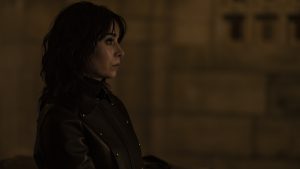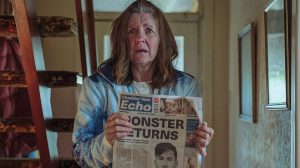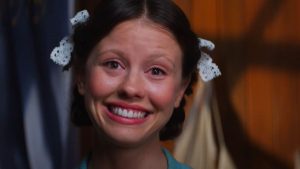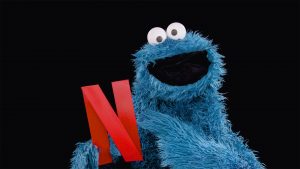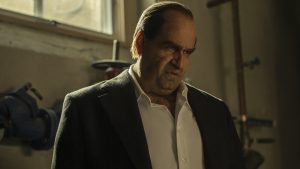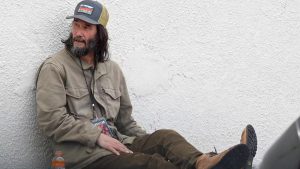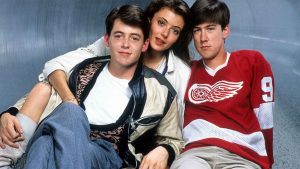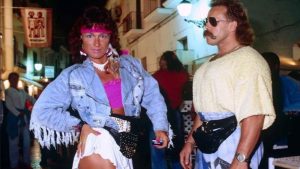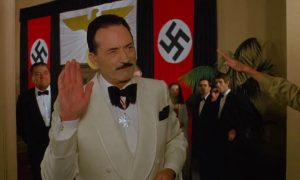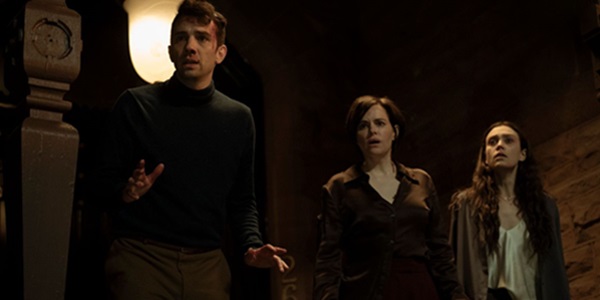
Acclaimed photographer Caitlin Cronenberg—yes, daughter of David and sister of Brandon—makes her feature directorial debut with Humane, a twisted mix of dystopian horror and class satire that will make you cringe and cackle in equal measure. Based on a script by Michael Sparaga, who also produced the film, Humane takes place in a not-too-distant future world where extreme ecological disasters have led world leaders to determine that the only way for humanity to survive is to strategically cull the population through euthanasia. And while Humane doesn’t feel like a cinematic game-changer in the same way films like Videodrome and Possessor did—the messaging is a bit too heavy-handed and the style not nearly visceral or memorable enough—it’s still a solid contribution to the horror genre from another member of Canada’s freakiest filmmaking family.
Future Nightmare
Our introduction to the world of Humane is all the more haunting for how closely it resembles our current state of being; Cronenberg resists the urge to fill the screen with obvious dystopian signifiers, opting instead for a few subtle twists that go a long way. The film opens with blue skies and sunshine (though reflective silver umbrellas are a necessity when moving around outside) as Trooper’s jaunty “We’re Here For a Good Time (Not a Long Time)” sets a mood of ominous forced optimism. Vans from the euphemistically named Department of Citizen Strategy (D.O.C.S.) drive around town to their various appointments, entering homes with medical equipment and exiting with body bags. If you volunteer to enlist in the D.O.C.S euthanasia program, your family gets $250,000—and if you’re an undocumented immigrant, your family gets on the fast track to full citizenship. Needless to say, the program is geared towards strategically culling the population of a very specific group of people: the poor, unfortunate, and unwanted.
source: IFC Films
Legendary news anchor Charles York (Peter Gallagher) is not one of those people. Yet to secure his legacy and set a good example for others, he and his wife, former restauranteur Dawn (Uni Park), decide to enlist and invite Charles’ four children over for dinner to break the news and have them witness the procedure. All four kids are disappointments to their father in some way or another: Jared (Jay Baruchel) is an anthropologist who is constantly on TV spouting government disinformation, Rachel (Emily Hampshire) is a cold-blooded pharmaceutical executive whose own company wants to fire her, Noah (Sebastian Chacon) is a piano prodigy turned drug addict who killed a woman while driving under the influence, and Ashley (Alanna Bale) is a struggling actress who can barely secure a commercial audition. No wonder, then, that Charles is willing to euthanize himself just for the sake of preserving the good family name, despite none of them needing the money.
However, when D.O.C.S. technician Bob (Enrico Colantoni) shows up at the front door of Charles’ sprawling estate to perform the procedures, nothing goes according to Charles’ carefully laid plan. First, Dawn disappears. Then, Bob breaks the news to the rest of the family: he has a contract to leave the house with two bodies, or he and his team won’t get paid. So, which one of them is willing to step in and sacrifice themselves for the greater good?
Nepotism, Baby
What follows is sheer mayhem as these four failed nepo-children argue amongst themselves over who most deserves to live or die—mayhem that quickly devolves into the kind of awkwardly hilarious yet gruesomely bloody violence that one should expect when a bunch of desperate people who have never held weapons before decide to try and fight for their lives. There is backstabbing of both the literal and figurative varieties and a hell of a lot of despicable behavior from pretty much everyone involved except Noah, whose struggles with addiction and newfound romance with another recovered addict have given him a healthier perspective on life, love, and happiness than any of his selfish siblings could ever hope to have.
source: IFC Films
That Cronenberg depicts the children of a famous man with such a deliciously mocking tone is extra amusing when one considers her background; I couldn’t help but imagine the family dinner scene of Humane with David subbed in for Charles and Brandon, Caitlin, and their older sister Cassandra all duking it out to not be the one to die. (What do you think Cronenberg family dinners are like, anyway? I bet the conversations are wild.) It’s refreshing that in making such a film, Cronenberg not only doesn’t shy away from acknowledging her privileged background—Humane’s press notes are chock full of mentions of her famous father, who also narrates some television commercials in the film—but also clearly has a sense of humor about it, and a delightfully dark and disturbing one at that. Really, though, the Yorks bear less of a resemblance to the Cronenbergs than to one of our most recent U.S. presidents and his brood of corrupt children, all of whom I have no doubt would shove each other off of a bridge if it meant gaining any small advantage for themselves.
The script by Sparaga is not exactly subtle in the way it sends up class privilege and creeping fascism, but that doesn’t stop it from being entertaining, especially when the dialogue is being delivered by such a solid ensemble cast as the one assembled here. Baruchel’s plea to adopted brother Noah that “I’m not racist, I’m an ally” is one of the most laugh-out-loud moments in the film thanks to Baruchel’s pathetic delivery, while Hampshire’s portrayal of the unabashedly cutthroat Rachel is so over-the-top that you can’t help but respect it. Gallagher is ideally cast as the outwardly respectable but inwardly unpleasant Charles, whose actions all have a sheen of nobility to mask how self-serving they are at the core. The standout, though, might be Colantoni, whose Bob is wonderfully creepy, a government employee who has totally drained the Kool-Aid convincing him that what he does is necessary for the world’s survival.
source: IFC Films
Humane takes place almost entirely within one location, and what a location it is: a late-nineteenth-century castle on Ravenscliffe Avenue in Hamilton, Ontario. It’s the kind of home that just oozes old wealth—you know, the kind of wealth that should serve as a shield to protect you from anything terrible ever happening to you. Using this elegant backdrop full of hand-carved moldings, painted frescos, and winding staircases for such brutal, bloody violence creates a rich visual contrast, and watching the Yorks chase each other through a real maze of a house adds to the already substantial tension of those scenes.
However, any style the film has is almost wholly created by this (admittedly amazing) set. Apart from the aforementioned opening sequence that sets up the world of the film, the creative vision that Cronenberg brings to so much of her photography work doesn’t seem to be present here. The film looks as though it could have been made by anyone; in contrast, her father and brother’s films don’t look like they could have been made by anyone else. (Indeed, you’d never guess that Humane was shot by Douglas Koch, who also shot Crimes of the Future—a film chock full of striking, memorable imagery.) Cronenberg is undeniably a great director of actors, but I’d love to see her bring more visual flair to any future feature films she makes.
Conclusion
A timely horror satire chock full of gore and guffaws, Humane entertains in spite of its flaws.
Humane opens in select theaters in the U.S. on April 26, 2024. It begins streaming on Shudder on July 26, 2024.
Does content like this matter to you?
Become a Member and support film journalism. Unlock access to all of Film Inquiry`s great articles. Join a community of like-minded readers who are passionate about cinema – get access to our private members Network, give back to independent filmmakers, and more.
